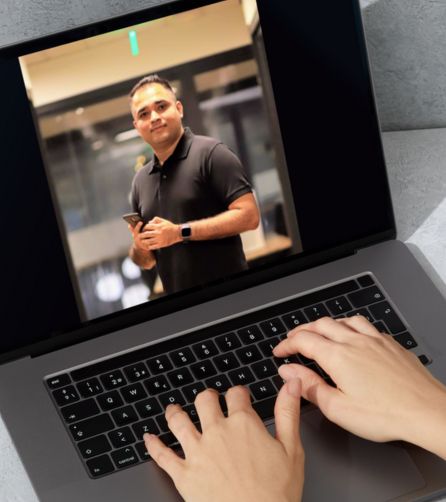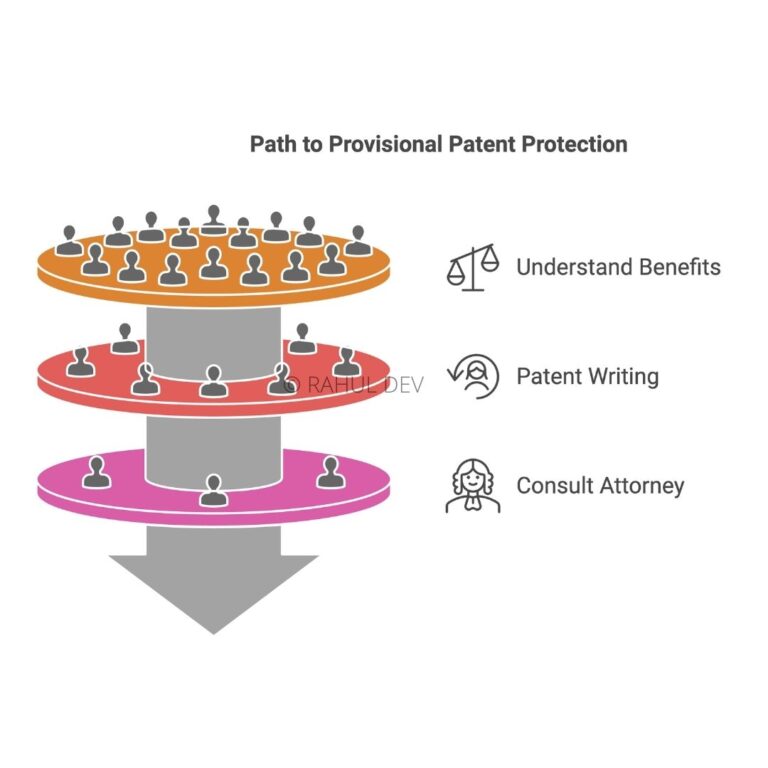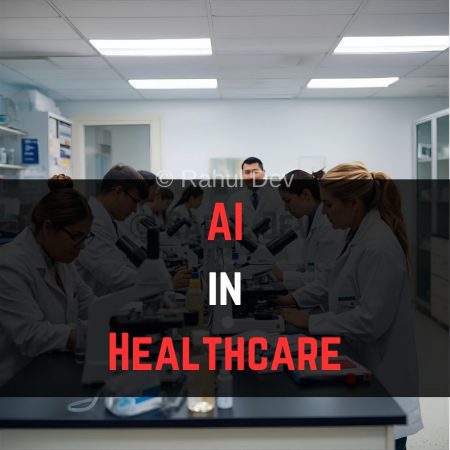Future of AI in Healthcare | How AI Will Transform Healthcare
AI Healthcare Strategy
Insights by Dr. Rahul Dev

Understand Practical Aspects
Understand the essential legal considerations for creating profitable Healthcare AI Assets

Insights by Dr. Rahul Dev

Understand the essential legal considerations for creating profitable Healthcare AI Assets

Protect your innovations across multiple countries and create strong patent portfolio to boost business valuation
Local and global brand protection through international trademark registrations
Extensive research and business writing for technical whitepapers and B2B content products
Here I discuss future of AI in healthcare including how AI will transform healthcare by 2030 and healthcare AI patent landscape. AI in healthcare represents the most transformative technological revolution in modern medicine, fundamentally reshaping how we diagnose, treat, and prevent diseases. The healthcare industry is being rapidly reshaped by AI, with its influence extending across clinical, administrative, and research domains. As AI in healthcare continues its rapid evolution, we’re witnessing unprecedented changes that promise to redefine medical practice by 2030. The medical field as a whole is experiencing a broad impact, as AI technologies drive improvements in diagnostic accuracy, treatment personalization, and operational efficiency.
Over the past decade, the integration of AI in healthcare has accelerated dramatically, with 94% of U.S. healthcare organizations now considering these technologies central to their strategic operations. From AI in healthcare applications that detect cancers invisible to human eyes to intelligent systems that predict heart attacks months before symptoms emerge, artificial intelligence is expanding the boundaries of what’s medically possible. Healthcare stands at the forefront of adopting and integrating AI technologies, setting new standards for innovation and patient care.
The AI in healthcare patent landscape has exploded in recent years, with Fortune 500 companies like Microsoft, Google, Amazon, and Oracle investing billions in proprietary algorithms and clinical decision-support systems. These industry leaders are driving AI innovation, shaping the future of healthcare technology and setting benchmarks for the entire sector.
The patents and innovations in AI in healthcare are driving competitive advantages while protecting breakthrough discoveries in medical imaging analysis, drug discovery acceleration, and personalized treatment optimization. Another area where AI-driven innovations and patents are transforming healthcare is robotic surgery, which enables more precise and minimally invasive procedures. Across the global healthcare sector, AI’s influence is broadening access, improving outcomes, and streamlining operations. The tremendous potential of AI in healthcare lies in its ability to transform diagnosis, enable early disease detection, and revolutionize patient outcomes.
This comprehensive guide examines how AI in healthcare will transform medical practice by 2030, exploring the specific applications, challenges, and opportunities that will define the next era of medicine. Data privacy and the protection of sensitive patient information are critical considerations as AI experimentation and deployment expand in healthcare. The regulatory bodies play a vital role in overseeing and ensuring the safe, ethical, and compliant use of AI systems, establishing standards and policies to protect patients and maintain trust. As Director of HashChain Consulting Group with 20 years of international consulting experience and expertise in patent law, data science, and emerging technologies, I’ve witnessed firsthand how AI in healthcare innovations are revolutionizing the intersection of technology, business, and healthcare delivery across global markets.
This article covers following topics:
What jobs will medical AI replace?
What are the 3 ways AI will change healthcare by 2030?
“While AI in healthcare can diagnose diseases with remarkable accuracy, sometimes performing better than human doctors, the technology works best when combined with human expertise, empathy, and understanding of individual patient circumstances.” – Dr. Rahul Dev
Dr. Rahul Dev, author of this article and Director of HashChain Consulting Group (USA), shares technology, business and legal stories by simplifying insights for founders, creators & curious minds. With 20 years of international consulting and advisory experience across the global markets, Dr. Rahul Dev is equipped with PhD Data Science to complement his extensive experience as International Patent and Technology Law Attorney. As Technical Data Writer, he primarily focusses on SaaS, Blockchain, Web3 & AI Research.

AI in healthcare is transforming how doctors diagnose diseases, treat patients, and manage medical records in clinical settings. AI technologies, including machine learning, deep learning, and advanced AI algorithms, help physicians and other healthcare professionals analyze medical images like X-rays and MRIs faster and more accurately than traditional methods. These systems process vast amounts of medical data, clinical data, and unstructured data to enhance diagnostic accuracy and support personalized treatment. Natural language processing enables AI systems to extract valuable insights from doctors’ notes, patient records, and other unstructured text data.
AI in healthcare systems can predict which patients might get sick before symptoms appear, allowing early intervention and improving health outcomes and timely care. In 2024, 94% of U.S. healthcare organizations considered AI adoption central to their operations, showing massive adoption across the industry and in real world settings. AI tools and AI models in healthcare automate administrative tasks like scheduling appointments, processing insurance claims, and summarizing patient charts, reducing administrative burdens and helping to reduce costs, saving doctors valuable time and improving operational efficiency. According to Microsoft, 66% of physicians reported using AI in healthcare tools in 2024, up from just 38% the previous year, highlighting the growing role of healthcare professionals and physicians in leveraging these technologies.
AI in healthcare also powers virtual health assistants that use speech recognition to answer patient and medical questions 24/7 without human staff. HCA Healthcare and Google Cloud launched an AI-driven “Nurse Handoff” tool in early 2024 that reduces the time nurses spend on paperwork between shifts. Patents and innovations in AI in healthcare are critical because they protect new medical algorithms and encourage companies to invest billions in research. Major pharmaceutical companies like Pfizer and Merck use AI in healthcare to discover new drugs faster, cutting development time from years to months. Innovations in AI in healthcare, including wearable devices and digital health solutions, are also improving remote patient monitoring, allowing doctors to track chronic conditions from patients’ homes and deliver timely care. AI in healthcare represents a complete reimagining of medical practice, making patient care more accessible, affordable, and effective for everyone in real world healthcare environments.
AI in healthcare is expected to replace or significantly change several administrative and routine medical jobs in the coming years. AI in healthcare will likely automate medical billing and coding positions, as these tasks involve repetitive, time-consuming data entry and administrative burdens that computers can handle more efficiently. Medical transcriptionists who convert doctor voice recordings into written reports are already being replaced by AI in healthcare systems, which are advanced computer programs that can transcribe and summarize notes instantly. In 2024, Salesforce’s Einstein AI demonstrated how AI in healthcare can automatically generate patient record summaries, reducing the need for dedicated documentation specialists and helping to reduce costs.
AI in healthcare will also impact radiology technicians who perform basic image analysis, though complex interpretation will still require human radiologists. Call center representatives in hospitals and insurance companies face replacement as AI in healthcare chatbots, which is another example of intelligent computer programs that can answer common patient questions about appointments, medications, and insurance coverage. CVS Health introduced AI-driven member navigation tools in 2025 that guide patients through healthcare decisions without human assistance. Data entry clerks and medical records coordinators will see reduced demand as AI in healthcare automates patient information management across electronic health record systems, further reducing administrative burdens and costs.
Patents and innovations in AI in healthcare are accelerating this transformation by creating smarter algorithms that can handle increasingly complex tasks previously requiring human judgment. In addition, remote monitoring is an area where AI is automating tasks and changing the roles of healthcare workers, especially as wearable devices and remote patient monitoring technologies become more prevalent. However, innovations in AI in healthcare are also creating new jobs like AI trainers, algorithm auditors, and healthcare data scientists who ensure these systems work safely.
The healthcare professionals will need to adapt to new technologies and collaborate with AI systems. AI in healthcare will transform prior authorization specialists, as Optum’s 2025 AI marketplace includes tools that automatically process approval requests. Rather than complete job elimination, AI adoption in healthcare will reshape roles, requiring workers to develop new skills in managing and collaborating with intelligent systems. As organizations adapt, medical practices are evolving with AI to improve efficiency, reduce costs, and enhance patient care.
AI in healthcare will fundamentally transform medical practice through three major changes by 2030: personalized treatment, predictive prevention, and automated operations.
First, AI in healthcare will enable truly personalized medicine where treatments are customized to each patient’s unique genetic makeup, lifestyle, and medical history. This is the essence of precision medicine, with AI-driven care aiming to deliver more accurate diagnostics and tailored therapeutics for improved patient outcomes. AI in healthcare systems will analyze millions of clinical data and medical data points to recommend the exact medication dosage, therapy type, or surgical approach that works best for individual patients rather than using one-size-fits-all protocols. AI-powered clinical decision support systems will assist clinicians in making evidence-based decisions tailored to each patient. Merck reported in 2025 that their researchers use large language models and AI agents to accelerate drug discovery, compressing clinical workflows that once took years into months.
Second, AI in healthcare will shift the focus from treating diseases to preventing them before they start. AI technologies and algorithms will continuously monitor patient data from wearables, genetic tests, and electronic health records to enable early detection of diseases, improve disease diagnosis, and identify early signs of conditions such as cancer, Alzheimer’s, and kidney disease. This predictive prevention approach leverages real world data from wearable devices and other sources to predict heart attacks, strokes, diabetes, and cancers months or years before symptoms appear. Johnson & Johnson highlighted in 2024 how AI-powered remote patient monitoring helps doctors track patient health in real-time and intervene early during clinical trials and ongoing care, using data from real world settings to enhance patient care.
Third, AI in healthcare will automate nearly all administrative tasks, allowing doctors and nurses to spend more time with patients instead of paperwork. Oracle announced an AI-driven electronic health record system in August 2025 and established an AI Center of Excellence for Healthcare in September 2025 to lead this operational transformation. AI also improves clinical trial design by optimizing planning, structuring, and efficiency, leading to faster and more accurate development of therapies.
Patents and innovations in AI in healthcare are essential drivers of these changes, protecting breakthrough algorithms and incentivizing technology companies to invest heavily in medical AI research. New innovations in AI in healthcare create competitive advantages for hospitals and health systems that adopt these technologies early. By 2030, AI in healthcare will make medical care more precise, proactive, and patient-centered than ever before in human history, with tremendous potential to improve health outcomes and revolutionize patient care in real world healthcare environments.
AI in the healthcare sector is going to create the most significant transformation in medical practice since the invention of modern medicine. AI systems, including advanced AI algorithms and every type of AI tool, will dramatically improve diagnostic accuracy, with algorithms detecting diseases like cancer, heart conditions, and neurological disorders earlier and more reliably than current methods. AI in health care will reduce medical errors, which currently cause thousands of preventable deaths each year, by providing doctors with real-time decision support and safety alerts, directly enhancing patient safety as a key benefit.
The impact of AI in healthcare on costs will be substantial, as automation and efficiency gains help reduce costs, potentially saving the U.S. healthcare system billions of dollars annually. AI in healthcare will democratize access to quality medical care, allowing patients in rural or underserved areas to receive expert-level consultations through AI-powered telemedicine platforms, which are a core part of digital health innovation.
According to the World Health Organization, addressing global health challenges and disparities is crucial, and AI can play a significant role in improving access and equity worldwide. Microsoft reported in 2024 that AI adoption in healthcare has accelerated rapidly, with 94% of U.S. healthcare organizations now considering it central to their future operations.
AI in healthcare will transform the patient experience by reducing wait times, streamlining appointment scheduling, and providing instant answers to health questions through intelligent virtual assistants, thereby reducing administrative burdens for clinicians and staff. Aetna launched AI-driven care paths and member navigation tools in July 2025 that guide patients through complex healthcare decisions without frustration or confusion. AI in healthcare will enable doctors to manage larger patient populations more effectively while maintaining personalized attention for each individual, supporting integration into clinical practice. AI technologies are also being used to analyze trends and outcomes at the population level, supporting population health management and public health initiatives.
The patents and innovations in AI in healthcare are driving this revolution by protecting novel medical algorithms and creating incentives for continued research investment by technology giants and startups alike, offering important insights for the future. Breakthrough innovations in AI in healthcare, such as Optum’s AI Marketplace launched in June 2025, are making it easier for healthcare providers to integrate cutting-edge AI tools into their existing systems and adapt their medical practices accordingly.
Generative AI is also emerging as a future innovation, with potential applications in summarization, decision support, and medical education. AI in healthcare will also impact medical education, with future doctors learning to work alongside intelligent systems rather than relying solely on memorized knowledge, while still valuing the expertise of human experts. Ultimately, AI in healthcare promises longer, healthier lives for everyone through earlier disease detection, more effective treatments, and truly preventive medicine.
AI in healthcare can absolutely perform disease diagnosis, and in many cases, it achieves high confidence in diagnostic results, sometimes performing as well as or better than human doctors at identifying specific conditions. AI in healthcare systems, powered by advanced AI algorithms, AI models, deep learning, and machine learning, excel particularly at analyzing medical images such as x ray, CT scans, MRIs, and pathology slides to detect cancers, fractures, and other abnormalities. These technologies are especially effective in diagnosing conditions like skin lesions, breast cancer, heart failure, and kidney disease, as well as pneumonia and early-stage lung cancer. AI in healthcare algorithms have been trained on millions of medical data and clinical data, allowing them to recognize patterns and subtle early signs of disease that human experts might miss, enabling early detection and improving health outcomes.
In 2024, AI in healthcare tools demonstrated remarkable accuracy in diagnosing skin cancers, diabetic retinopathy, pneumonia, and early-stage lung cancer from imaging studies, providing important insights for patient care. AI in healthcare can also diagnose diseases by analyzing patient symptoms, medical history, lab results, and vital signs, comparing them to case presentation data to suggest possible conditions and recommend appropriate tests.
Also, AI-powered triage systems can prioritize patient cases based on urgency, helping healthcare providers deliver timely care. However, AI in healthcare currently works best as a diagnostic assistant or AI system rather than a complete replacement for the physician, who provides clinical judgment and considers factors beyond data. Google Cloud and HCA Healthcare developed AI tools in early 2024 that help healthcare workers synthesize patient information more quickly, improving diagnostic speed and supporting precision medicine without replacing human oversight from human experts and physicians.
AI in healthcare diagnostic systems must still be reviewed and approved by licensed medical professionals before treatment decisions are made. The accuracy of AI in healthcare diagnosis depends heavily on the quality and diversity of medical data and clinical data used to develop the AI algorithms. Patents and innovations in AI in healthcare diagnostic tools are crucial because they protect the proprietary algorithms that companies spend years and millions of dollars developing. New innovations in AI in healthcare continue to expand diagnostic capabilities, with pharmaceutical companies like Pfizer using AI to identify disease patterns and develop targeted treatments faster than traditional methods, further advancing precision medicine and improving health outcomes.
AI in healthcare has shown particular promise in diagnosing rare diseases that many doctors might never encounter in their careers, by comparing patient presentations against comprehensive medical databases. While AI in healthcare can diagnose diseases effectively and provide early detection of early signs, the technology works best when combined with human expertise, empathy, and understanding of individual patient circumstances, ensuring optimal patient care and drawing on important insights from both AI and human experts.

As a business coach and thought leader, I cannot emphasize enough the importance of innovation, new software patents, mobile apps, and patents for tech companies, startups, and entrepreneurs. The world is rapidly evolving, and staying ahead of the curve is vital for success. Embracing technological advancements such as blockchain and AI can unlock unprecedented opportunities, streamline operations, and propel businesses into the future with competitive valuation via intangible assets.
Click Here for AI Startup Valuation Guide.
For instance, blockchain technology can revolutionize supply chain management and secure data sharing wherein innovative business models are explained to the audience via technical whitepapers, while AI can automate and optimize decision-making processes. Mobile apps are no longer just a luxury; they have become essential tools for engaging customers and offering personalized experiences. Furthermore, securing digital innovation patents is crucial for protecting intellectual property, fostering innovation, and maintaining a competitive edge. By investing in these areas, businesses can position themselves as industry pioneers and pave the way for a prosperous future after thoroughly conducting the due diligence and reviewing the legal opinion letters, which in case of digital assets can assist in determining the tokens as utility assets or coins as utility tokens before listing the assets at an exchange.
Our team of advanced patent attorneys assists clients with patent searches, drafting patent applications, and patent (intellectual property) agreements, including licensing and non-disclosure agreements. Advocate Rahul Dev is a Patent Attorney & International Business Lawyer practicing Technology, Intellectual Property & Corporate Laws. He is reachable at rd (at) patentbusinesslawyer (dot) com & @rdpatentlawyer on Twitter.
Quoted in and contributed to 50+ national & international publications (Bloomberg, FirstPost, SwissInfo, Outlook Money, Yahoo News, Times of India, Economic Times, Business Standard, Quartz, Global Legal Post, International Bar Association, LawAsia, BioSpectrum Asia, Digital News Asia, e27, Leaders Speak, Entrepreneur India, VCCircle, AutoTech).
Regularly invited to speak at international & national platforms (conferences, TV channels, seminars, corporate trainings, government workshops) on technology, patents, business strategy, legal developments, leadership & management.
Working closely with patent attorneys along with international law firms with significant experience with lawyers in Asia Pacific providing services to clients in US and Europe. Flagship services include international patent and trademark filings, patent services in India and global patent consulting services.
Global Blockchain Lawyers (www.GlobalBlockchainLawyers.com) is a digital platform to discuss legal issues, latest technology and legal developments, and applicable laws in the dynamic field of Digital Currency, Blockchain, Bitcoin, Cryptocurrency and raising capital through the sale of tokens or coins (ICO or Initial Coin Offerings).
Blockchain ecosystem in India is evolving at a rapid pace and a proactive legal approach is required by blockchain lawyers in India to understand the complex nature of applicable laws and regulations.